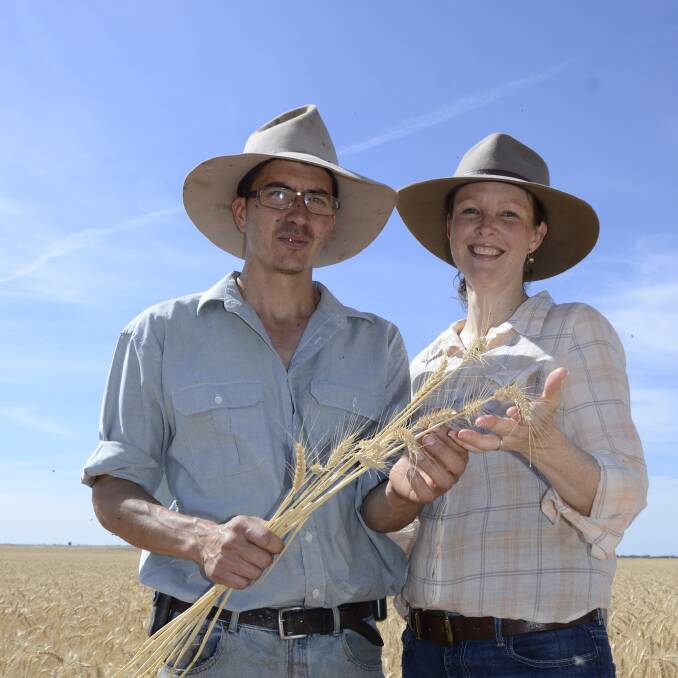
A BELIEF that conventional cropping systems will struggle to be sustainable has led a South Australian farming couple to tackle the challenge of an organic broadacre cropping business.
Josh and Peri McIntosh, Nadda, south-east of Loxton, are farming their Border Park property according to organic principles.
The property has been certified organic since 1996, but Mr McIntosh said some tweaks in recent years were ironing out some of the major issues with organic cropping.
"One of the major problems I had with organic cropping was that it relied so heavily on cultivation, which in turn had a detrimental impact on the soil," Mr McIntosh said.
He is currently in the middle of a Nuffield Scholarship looking into ways to improve soil structure within a broadacre organic operation.
Mr McIntosh said the biggest weapon in terms of getting better soil structure was the plants themselves.
"Plant root exudates and carbon cycling are what builds soil."
With this in mind he said he welcomed plants at any time of the year.
Over summer we have prolific native grasses, and in winter we have medics and ryegrass," he said.
"While growth could be seen as a drain on moisture reserves for the upcoming crop it also is invaluable in retaining soil structure and improving soil moisture retention."
Mr McIntosh said while there was probably some moisture losses compared to a conventional system it was not as clear cut as it appeared at a cursory glance.
"We also have the benefit of having feed for our livestock over summer so when you add it up there is a good case for retaining the plants over summer," he said.
Livestock are a critical part of the McIntosh family enterprise.
"Having a pasture phase is really important to the cropping system and lowers the risk when compared to a conventional continuous cropping system," he said.
"Having a good pasture phase with strong bulk and healthy roots is fantastic for the next year's crop, especially when you have a legume in that pasture mix."
"We don't believe a cropping system where you constantly have to up the inputs to maintain production is sustainable."
The McIntosh family operate off a three year rotation, with the legume / pasture phase first, followed by a wheat crop and a floating final year according to paddock history and conditions.
"The rotation is opportunistic," Mr McIntosh said.
"We are always ready to promote the most plant growth we can whenever conditions allow.
The go-to method is broadcasting a seed mix and lightly working it in straight after rain.
The resultant groundcover stops wind erosion and provides nitrogen, grazing and in a good year - hay.
"By keeping livestock on the cover crop we are able to keep it growing and keep it vegetative and not going reproductive until the plants run out of moisture. As well as groundcover and feed benefits, we see that water as being invested for following years as carbon." he said.
The McIntoshes run their cropping enterprise in conjunction with sheep and beef cattle and a seed business over 2,400 hectares with a nominal average annual rainfall of 280mm, with wheat the major earner across the farm.
"The droughts have been very tough to manage over the past five years, we had one year with just 110mm and only 75mm of that in the growing season," Mr McIntosh said.
However, he said a low input cropping system, combined with the livestock, helped reduce the risks.
"We're never growing to grow massive crops in an organic low rainfall system so we're targeting lower yield, high value opportunities and resilience through diversity."
And there is a clear premium for organic wheat, which can fetch from between $600 a tonne to $1200/t depending on the season and quality.
"Our breakeven yields are relatively low, which is critical in this dry area."
"A tonne to the hectare in our three year rotation at organic prices is equivalent to the returns in continuous cropping in the area, although we won't always achieve that yield with our risk of dry finishes."
He said the dry did have advantages as it meant that fungal disease was rarely a problem.
"We don't ever have disease problems to a level that would warrant spending money on it," he said.
In terms of finding cash crops outside wheat, Mr McIntosh said he had been unable to grow grain pulses, such as field peas or lupins successfully as a mono crop and was yet to try lentils but said it was on the radar with inter-row cultivation.
"Pulses grown with cereals are a good fit within the rotation," he said.
"Peas and oats work well together and we will seed more peas and triticale this season because it can go in later than the wheat."
He said he was aiming to gather quantifiable data about what measures were driving soil health improvements.
"We've been part of a six-year regenerative grazing programme facilitated by Natural Resources SA Murray Darling Basin that is gathering data on soil and agroecosystem health.
"The findings have been really insightful. We feel that by trying to limit the amount of cultivation, managing grazing and promoting plant growth between crops, we're on the right track."


